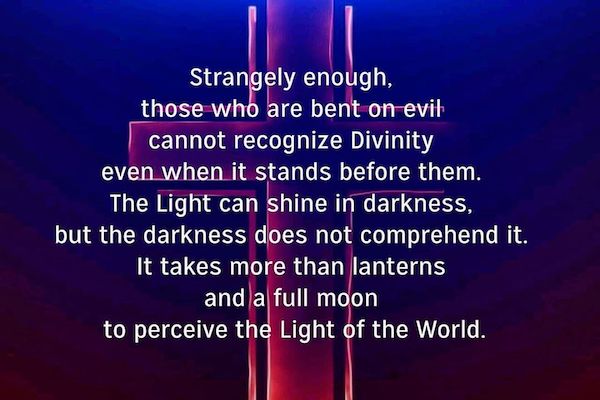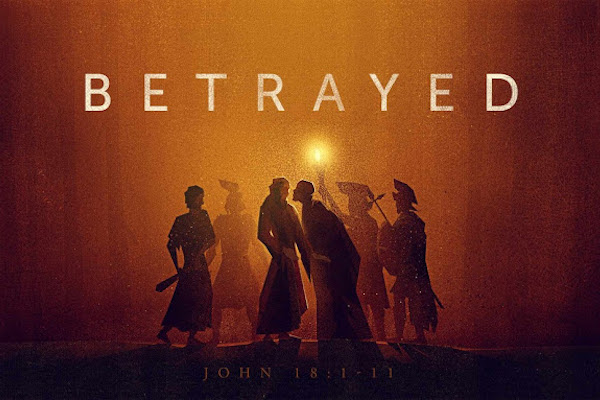LENT 2024: Day 23 - LIFE OF CHRIST

LENT 2024: DAY 23 - Monday March 11
“He Who had freed Lazarus from the bonds of death now submitted Himself to death. Judas led a band of officers from the chief priests and Pharisees, carrying lanterns, torches, and weapons. Both Jew and Gentile united in the arrest of Christ. Though the moon was full, Judas had to give to the Roman soldiers a sign by which they would know Our Lord; the sign He gave was the kiss. But before the torches could search out the Light of the World, the Good Shepherd went forth to meet them.
“So Jesus, knowing well what was to befall Him, went out to meet them.” (John 18:4) In the full consciousness of all the Old Testament prophecies concerning Himself as the Lamb of God and of His self-willed offering for sin, he went forth in self-surrender. Addressing with overpowering majesty the multitude which had gathered armed with swords and stones, he challenged them to name the One they sought: “’Who is it you are looking for?’ ‘Jesus of Nazareth’, they answered.” (John 18:5) They did not say “Thee”, or “Thou art the One.” It was evident that even under the full moon they did not recognize Him. That was why, too, they had prearranged a sign with Judas by which they would know Him – the kiss. Strangely enough, those who are bent on evil cannot recognize Divinity even when it stands before them. The Light can shine in darkness, but the darkness does not comprehend it. It takes more than lanterns and a full moon to perceive the Light of the World.
So He told them, “I am Jesus of Nazareth.” A paralyzing awe came over all of them, and they fell backward on the ground… He could have walked away free, with the soldiers and His enemies prone upon the ground, but it was the “Hour” when Love fettered Himself to unfetter man.
Self-sacrifice seeks no vengeance. Judas and the others had no power to capture Him unless He freely delivered Himself into their hands. Giving His enemies power to stand, He, as the Good Shepherd, had only one concern, that of His own sheep: “If I am the man you are looking for, let these others go free.” (John 18:8) He must go to sacrifice alone… This was His Hour, but not the hour of the Apostles. Later on, they would suffer and die in His name, but presently they could not understand Redemption until the Spirit had enlightened them… Furthermore, they could not suffer for Christ until He had first suffered for them.
Peter… taking one of the two swords which he carried… struck Malchus, the servant of the high priest. As a swordsman, Peter was a good fisherman, for the best that he could do, in his wild intent, was to cut off the ear of Malchus. Though Peter’s zeal was honest, well-meaning and impulsive, yet it was mistaken in the choice of means. Our Blessed Lord first touched the ear of the wounded man and restored it; then, turning to Peter, He said: “Put thy sword back into its sheath. Am I not to drink that cup which My Father Himself has appointed for Me?” (John 18:11)
Here in contrast were set the sword and the cup; the sword wins by slaying, the cup by submission… Often he had referred to His Passion and death under the analogy of a “cup”, as when He asked James and John if they could drink the cup of His Passion. Now He speaks of the cup as not coming from Judas, nor from the Sanhedrin, nor from the Jews, nor from Pilate or Herod, but from His own Heavenly Father. It was a cup which contained the Father’s will that in love for men, He should offer His life that they might be restored again to Divine sonship. Nor did He say that a sentence was laid upon Him to undergo His Passion, but rather that He Himself out of love could not do otherwise. “Am I not to drink that cup?”… Looking beyond all secondary causes, such as Pilate and Annas, the Romans and the Jews, Our Lord saw not enemies to be defeated by a sword, but a cup offered by His Father. Love was the motive and spring of His Sacrifice as He said: “God so loved the world, that He gave up His only-begotten Son so that those who believe in Him, may not perish, but have eternal life.” (John 3:16)… Here Our Lord refused to see the hand of His enemies in His death, but passed immediately to the idea of the cup His Father gave Him. In that love He reposed even though the cup for the moment was bitter, for good was to come from it.
Delivering Himself into their hands, what Our Lord foretold about His Apostles now came to pass: “And now all His disciples abandoned Him and fled.” (Matthew 26:56) Peter, who had drawn the sword in defense against the cup, fled from sight. Later he secretly followed at a safe distance. John also crept on safely behind the mob, to appear later in the house of the high priest. But Judas remained to hear the word “hour” the Master had uttered first at Cana: “This is your hour and the power of darkness.” (Luke 22:53) Many times He told His enemies and Herod that they could do nothing to Him until His “Hour” had come. Now He announced it; it was the hour when evil could turn out the Light of the World. Evil has its hour; God has His day. He Who, when He took on Himself a human nature at Bethlehem, was bound with swaddling bands and laid in a manger is now to be bound with ropes and laid on a Cross… The Apostles, hearing the clinking of chains and seeing the glistening swords, forgot all the glory of the Messias, deserted Him, and fled. The High Priest must offer the sacrifice alone.”

(Chapter 42, pgs. 697 – 708)
+ QUOTES FOR LIFE